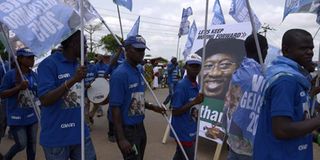Nigeria police restrict movement for election day

Supporters of Nigerian President Goodluck Jonathan of the ruling Peoples Democratic Party during a rally in Akure, Ondo State in southwestern Nigeria, on March 24, 2015. PHOTO | PIUS UTOMI EKPEI |
What you need to know:
- Police said there would be a "total restriction" of vehicles between 8 am local time, when polling stations open, and 5 pm.
- Ambulances, fire service trucks and others on "essential duties" would be exempt.
ABUJA
Nigeria's federal police chief on Tuesday ordered restrictions on movement on election day this weekend, as the country goes to the polls to choose a new president and parliament.
Police said there would be a "total restriction" of vehicles between 8 am local time, when polling stations open, and 5 pm.
Ambulances, fire service trucks and others on "essential duties" would be exempt, the Inspector-General of Police, Suleiman Abba, said in a statement.
Travel restrictions are routinely put in place for elections in Nigeria, where politically-linked violence by roaming gangs of hired thugs has been common.
Abba said the measures were designed to "ensure adequate security" in Saturday's vote, in which President Goodluck Jonathan is hoping to win a second term of office.
Identical restrictions will be put in place on April 11 for gubernatorial and state assembly polls, he added.
POSTPONED VOTE
Security has been a major concern for the general election, with Nigeria's electoral commission forced to postpone a vote scheduled for February 14 because of the deadly Boko Haram insurgency.
The decision was made after the country's national security advisor said soldiers deployed on operations to fight the Islamist militants would be unable to provide security if required.
Claimed military successes against the Islamist rebels over the last month have raised fears that they will revert to suicide attacks and bombings, including at polling stations.
"Adequate security logistics and manpower have been strategically deployed to achieve a most conducive electioneering atmosphere," Abba said.
"Policemen for election duty have been properly trained, briefed and sensitised on their roles," he added.





